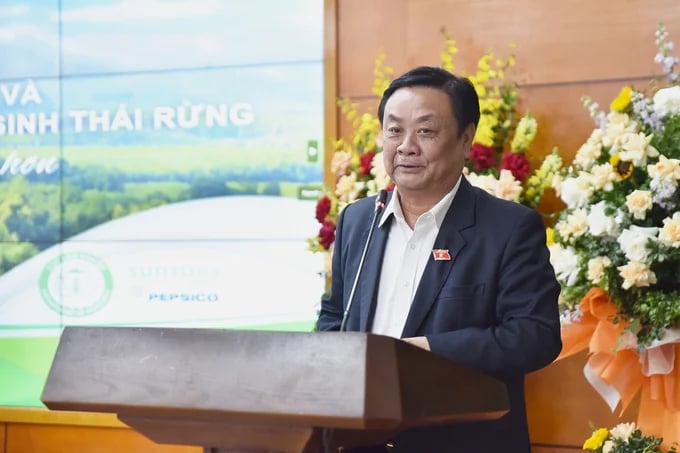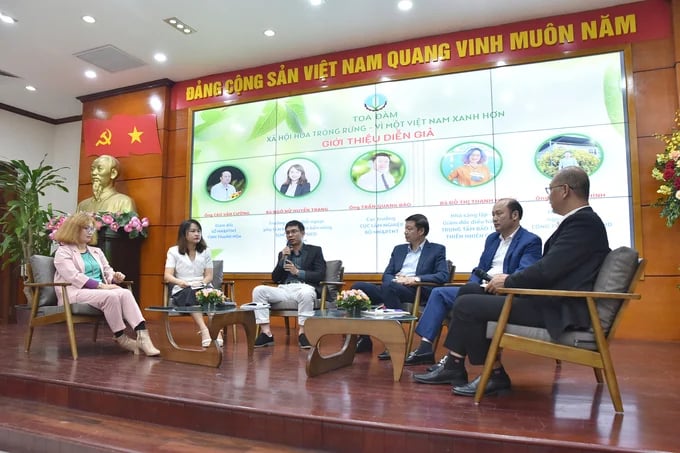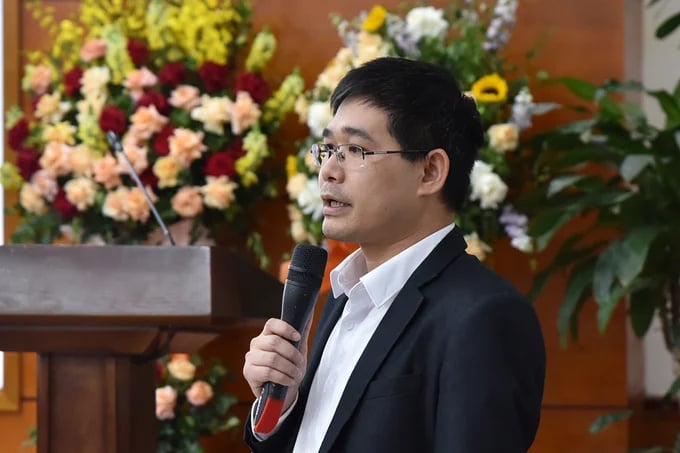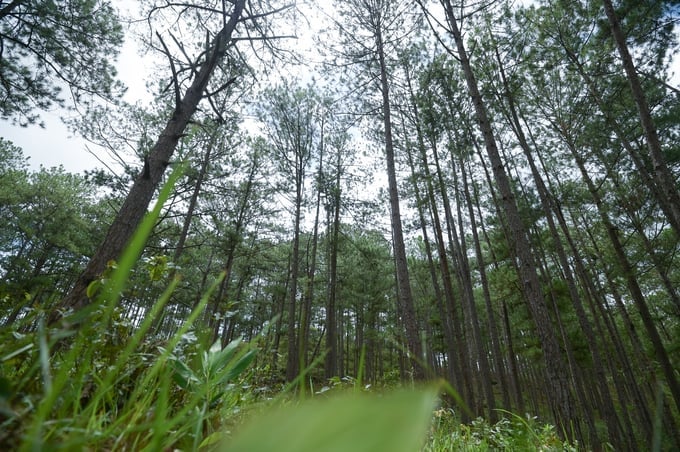November 27, 2025 | 18:49 GMT +7
November 27, 2025 | 18:49 GMT +7
Hotline: 0913.378.918
November 27, 2025 | 18:49 GMT +7
Hotline: 0913.378.918

Minister Le Minh Hoan said it is necessary to open thinking and open valuable forest space. Photo: Tung Dinh.
The seminar "Socialization of Afforestation and Development of Multi-Use Values in Forest Ecosystems" took place at the MARD. The event saw the active participation of Minister Le Minh Hoan, various units and organizations, officials, businesses, and National Assembly delegates from forested localities.
Minister Le Minh Hoan underscored the necessity of adopting a new approach towards forests, aiming to balance preserving and deriving value from them. Specifically, he advocated for a shift from merely hiring individuals to protect forests to devising strategies for creating more jobs and sustainable livelihoods beneath the forest canopy. This shift in perspective led to the conceptualization of multi-use forests.
Leaders of the MARD expressed the view that the current value extracted from forests does not match their full potential. Minister Le Minh Hoan stated, "Discovering greater values will encourage businesses, individuals, and authorities to participate actively in the protection and development of forests."
According to the Minister, opening up forests involves not only introducing new ways of thinking but also creating more valuable spaces for forests. "Forests possess not only economic and environmental values but also community and cultural significance, embodying the beliefs of thousands of people," emphasized the head of the MARD. He further analyzed that when people recognize the loss of value beneath the forest canopy with the disappearance of the forest itself, a collective voluntary effort to preserve the forest ensues.
Minister Le Minh Hoan emphasized that businesses must undergo substantial changes, moving beyond transactional relationships with forest growers. Instead of mere buying and selling transactions, businesses should consider forest engagement as an investment and collaboration with local communities. Specifically, businesses can work in tandem with local residents, establishing a network of connections, forming cooperatives, prioritizing community interests, and providing a conducive environment for voluntary and effective forest preservation.
"It's essential to recognize that a forest is more than just trees and wood; it embodies culture and beliefs, representing values far beyond material resources," Minister Le Minh Hoan emphasized. This holistic perspective benefits local communities and instills a sense of security among the forces that safeguard the forests.

Management agencies, non-profit organizations, and forest-related businesses attended the discussion. Photo: Tung Dinh.
During the seminar, Mr. Tran Quang Bao, Director of the Forestry Department, shared that Vietnam has currently imposed a closure on natural forests until at least 2030. Special-use and protection forests, covering about 7 million hectares, are mandated to remain untouched. The remaining 4 million hectares of protective forest require restoration. Consequently, only nearly 4 million hectares are available for exploitation and production.
Mr. Bao acknowledged that regions like the Northwest and Central Highlands possess ample space for afforestation, yet developmental efforts need to align with the existing potential. He noted, "Developing timber resources from high-altitude areas significantly escalates transportation costs."
Forestry Department leaders advocate for establishing processing factory clusters strategically located for easy access to raw material areas to address bottlenecks in afforestation and promote socialization in afforestation.
Furthermore, Mr. Bao highlighted Vietnam's significant advantage in hybrid acacia varieties. After years of research, these varieties have proven well-suited for local soil conditions, exhibiting rapid growth and robust resistance to pests and diseases. This advantage positions the forestry industry to achieve an export turnover of $20 billion USD in the coming years.
During the discourse on the socialization of afforestation, Mr. Tran Nho Dat from the Department of Special Use and Protection Forest Management within the Department of Forestry underscored the vital role of Vietnam's forests. Annually, these forests yield approximately 31 million m3 of wood, contributing over 17 billion USD to exports. Moreover, they hold significant potential for emissions reduction, carbon absorption, and the provision of essential environmental services.
Despite these advantages, forest conservation and development encounter substantial challenges. There needs to be more planning for large, concentrated timber-growing areas, an absence of organized production chains, and an income level that aligns with the value generated.

Mr. Tran Nho Dat, Department of Special Use and Protection Forest Management, Department of Forestry, shared about developing the multi-use value of forests. Photo: Tung Dinh.
The MARD, particularly the Department of Forestry, has been tasked with formulating a project to develop the multi-use value of forest ecosystems until 2030, with a vision extending to 2050. The completion and submission of this project to the Government are expected by November 2023.
The project, geared towards enhancing management efficiency, job creation, income augmentation, stability, socio-economic development, and the conservation of natural resources, outlines six key solutions. Mr. Dat elucidated, "We prioritize activities that preserve the biodiversity of forest ecosystems, focusing on the restoration and improvement of forest quality. Concurrently, we aim to cultivate sustainable non-timber forest products and medicinal herbs, intertwining them with the community's cultural traditions."
Providing insight into forest ecological development, Ms. Pham Thu Thuy, a Center for International Forestry Research (CIFOR) representative, shared perspectives from surveys across nearly 100 countries, including forestry-strong nations like Finland. She highlighted that the socialization of afforestation is a preferred strategy for many countries.
Ms. Thuy pointed out that highly developed countries in afforestation employ financialization in forest-related policy mechanisms. This includes establishing a biodiversity credit market and treating forests like stocks traded on stock exchanges. Governments create investment and conservation funds, levy taxes on forest ecosystems, and engage in insurance and landscape credit markets. Any entity seeking to derive value from the forest must navigate this comprehensive system.
Concurring with the call for the socialization of afforestation at the local level, Mr. Cao Van Cuong, Director of the Department of Agriculture and Rural Development of Thanh Hoa province, acknowledged that it involves mobilizing and coordinating people and organizations at every stage, from seed development. According to Mr. Cuong, socialization is multi-party, interdisciplinary cooperation involving localities, organizations, and countries and regions.

When promoting the multi-use values of forests, forests will be protected voluntarily. Photo: Tung Dinh.
Existing challenges
Ms. Ngo Nu Huyen Trang, Head of Foreign Affairs in charge of sustainable development at Suntory PepsiCo Vietnam Company, supported the socialization of afforestation. However, she raised concerns about whether investment resources are directed toward the right objectives, contributing to value-added development and ensuring livelihoods.
Acknowledging existing limitations, Ms. Trang noted that the socialization of afforestation is garnering increasing attention and response from individuals, businesses, and organizations. This contributes to the realization of afforestation and development targets in forestry economics.
On the other hand, Mr. Ha Dang Chinh, Head of the Wood Materials Department at Woodsland Joint Stock Company, admitted the challenges businesses face in convincing individuals to preserve extensive wood forests. Given that forest growers are typically small and fragmented, the prevailing mindset of spontaneous exploitation poses a persistent challenge.
Over the years, the State has encouraged participation from all economic sectors in forest development through crucial policies such as land and forest allocation, specific investment incentives, promoting cooperation and production linkages, and preferential loan support. Consequently, diverse resources and capital have been mobilized, with state budget contributions at approximately 17%. The remaining 83% comprises socialized capital from investments, contributions, and support from organizations, businesses, and individuals.
Translated by Quynh Chi

(VAN) After 30 years, both sides identified strategic areas of cooperation: sustainable production, increasing coffee value and training for farmers.
/2025/11/27/4910-4-164708_294.jpg)
(VAN) On the afternoon of November 27 in Beijing, Minister of Agriculture and Environment Tran Duc Thang held a working session with several major Chinese enterprises operating in the agriculture and environment sector.

(VAN) The Department of Animal Health issued a provisional guideline requesting local authorities to increase surveillance, collect samples for testing, and conduct epidemiological investigations according to the established procedure.

(VAN) The United Nations recommends that Vietnam utilize data and artificial intelligence to enhance early disaster warnings and reduce GDP losses by 3.2% in the context of climate change.

(VAN) On the morning of November 27 in Beijing, Minister Tran Duc Thang and the Deputy Commissioner General of the General Administration of Customs of China signed a protocol on fresh jackfruit exports.

(VAN) As floodwaters recede, a vast network of irrigation works across eastern Gia Lai is emerging in a state of severe disrepair, with extensive damage demanding urgent restoration ahead of the 2025-2026 winter-spring cropping season.

(VAN) The conference reviewing three years of implementing Decision 911 identified the need to prioritize improving marine environmental quality and promoting sustainable fisheries development.